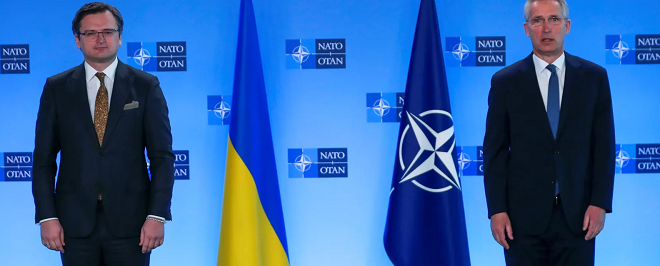Can it really be true, at this date in 2021, that large-scale war in Europe is again possible? Why are about 100,000 Russian troops massing near their country’s border with neighboring Ukraine — a country with which Russia shares a close history, religion, culture, and previous membership in the Soviet Union? And most of all, what can the United States and allies do about the situation?
President Joe Biden has taken the Russian troop buildup seriously, as he should. His call last week with President Vladimir Putin provided a good start to crisis management. Warning Putin about much more severe economic punishment than Russia has experienced to date, if it should invade Ukraine, Biden struck the right balance. He appears to have avoided ill-advised threats to start World War III over a distant part of Europe not integral to core American security, yet sent an unmistakable message of firmness.
U.S. and European Union sanctions imposed over the past seven years, since Russia grabbed back Crimea back from Ukraine with its “little green men” attack and then fomented a separatist revolt in Ukraine’s east (that has since killed at least 13,000), have kept the Russian economy on its back. Its gross domestic product growth has for a decade averaged just about 1% a year.
I would have preferred that Biden be even more specific about the types of new sanctions and related steps we might consider — for example, he could have promised that NATO would fund construction of more liquid natural gas terminals in Western Europe to reduce the region’s need for Russian gas, should Putin choose war. But the message was still well delivered, in a calm yet firm manner, and the past seven years of previous policy give it credibility.
NATO MEMBERSHIP WON’T PREVENT WAR
However, we need to think bigger. The crisis this year arose partly because Ukrainian President Volodymyr Zelenskyy recently asked NATO to bring his country into the Western alliance soon. He wonders why we have not done so. After all, back in 2008 during the Bush administration, the United States and NATO allies promised they would in fact someday invite Ukraine and Georgia into NATO — though they provided no timetable and no interim security help, in effect painting a bullseye on the back of both countries. Putin has been sure to keep them unstable, and thus ineligible for NATO membership, ever since.
Some might think it wise to accept Ukraine as a NATO member, along with the promise of American and other allied direct military help in the event of a future war. NATO is founded on its Article 5 mutual-defense pledge and has worked very hard since 2014 to prove it is serious about backing up that pledge for the Baltic states of Estonia, Latvia, and Lithuania, as well as other Eastern European members like Poland. Wouldn’t bringing Ukraine and Georgia into NATO discourage Russia from any aggression?
I doubt it. Russia cares too much about these countries, right on its doorstep, interwoven so closely with its history, its people, its geography — and thus its security.
RETHINK NATO EXPANSION
We should rethink the NATO expansion idea. It is virtually guaranteed to provoke Putin — and most other Russians. Moreover, as Putin’s big military exercise is demonstrating, he can get to Ukraine a lot faster than we can, with big forces. Are we really ready to compensate for our short-term conventional military inferiority in any crisis there with a huge buildup like that of Operation Desert Storm — or with the threat of nuclear war? How would we defend Ukraine and Georgia if Putin, or another future Russian leader, decided to test our mettle after we brought them into the alliance someday?
NATO was not created, and should not now be used, in an attempt to solve every European security problem. It started in 1949 with just 12 members. It added only four in the next 40 years — Germany, Greece, Spain, and Turkey.
Visionaries like the great American statesman of yesteryear, George Kennan, saw the original purpose of a unified West as ensuring that the core industrial, economic, and military regions of the world not fall under the sway of a hostile power. The idea was not, and should not now be, growth for growth’s sake. NATO is not a club of democracies trying to enlarge as much as it can.
Ukraine, Georgia, and other former Soviet republics are wonderful, proud, sovereign countries. They are not, with all due respect, key parts of the world’s core strategic zones in terms of scientific, industrial, or economic prowess. They are not places we should be prepared to send U.S. troops to fight and die, with risk of escalation even to nuclear conflict, in the event of war.
We need to find different ways to protect Ukraine, Georgia, and other neutral countries of Eastern Europe, involving some version of long-term neutrality or nonalignment. Any new security arrangement needs to place demands on Moscow, too, of course — to stop stoking separatism in eastern Ukraine (and northern Georgia), to acknowledge those countries’ full sovereignty and rights to join other international organizations like the European Union, to allow verification that Russian military shenanigans are over. And tough sanctions should remain on Russia in the meantime, because of its past actions.
It is this subject of a new security system for Eastern Europe that Biden and Putin should pursue, along with other NATO leaders, in the summit they are now considering. We have been in a strategic limbo on the question of further NATO expansion for too long already; it is time for a new, big, better idea.
 Eurasia Press & News
Eurasia Press & News



